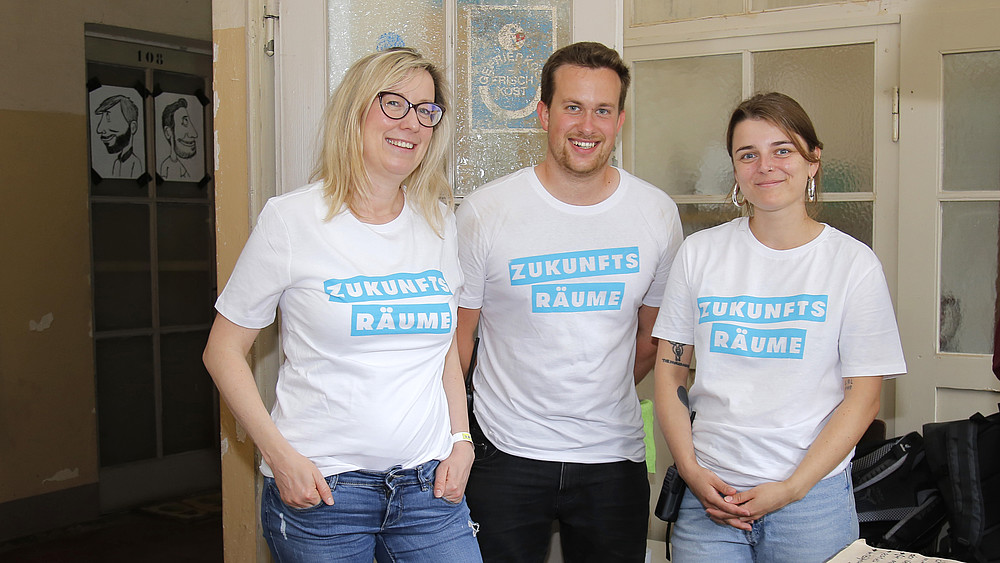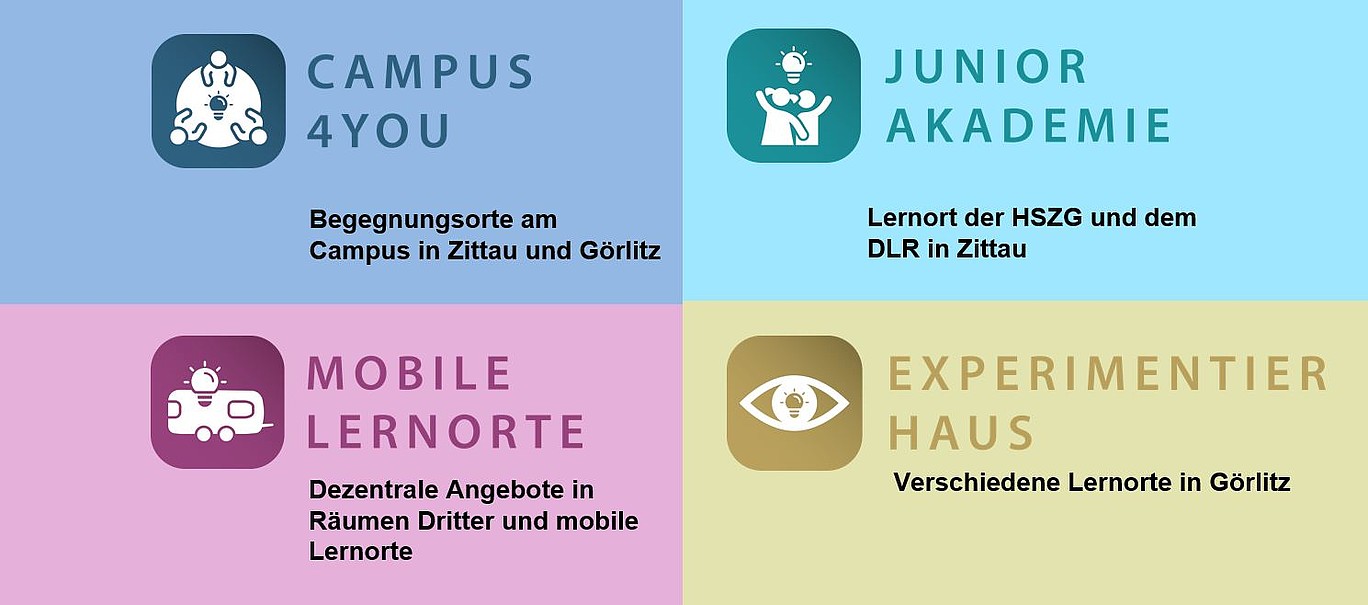HSZG students and Vice President develop innovative ideas for the design of the campus of the future at the "Future Spaces" event in the Kühlhaus Görlitz.

On June 28, 2023, more than 200 students, professors, HSZG employees and interested people from the region took part in the event "Future Spaces - A Festival of Encounter and Exchange" at the Kühlhaus Görlitz. The event offered participants a wide range of eleven workshops in which they could try out new technologies or engage in craft and artistic activities. At the same time, they had the opportunity to develop ideas for the university campus. On behalf of the university management, the aim of the workshops was to give participants the opportunity to contribute their wishes, ideas and suggestions for the redesign of the two university campuses and to discuss them together.
Our goal as university management is to make the campus more pleasant for teaching, learning, living and working. I am particularly pleased about the commitment of our students, who are actively shaping the future of their university with the organization of this event and their numerous ideas and concrete proposals for implementation and are making a valuable contribution to the strategic university project ZukLOS.
”The eleven workshops at the event were offered by regional players such as Leucht One GmbH, ENO mbH, the Interdisciplinary Center for Transformative Urban Redevelopment (IZS) as well as students and employees of the university. The content of the workshops provided participants with examples of the complexity of the planning project to design our campus of the future. At the same time, they served as a source of inspiration for brainstorming.
In the "Campus (T)Raum Workshop" , Saskia Brosis worked with the participants to develop what the "perfect" campus of the future should look like. For example, the participants would like to see improved networking between the two university locations. From the participants' point of view, the accessibility of the locations should be improved, especially without a car. On the other hand, cross-faculty / trans-faculty cooperation in projects and the organization of events should be strengthened. Barrier-free, comfortable and above all practical workplaces should be created in the premises and outdoor areas. In the teaching/learning rooms and in the university buildings, the participants wanted light wall colors, lots of plants and the use of ethereal room fragrances to promote learning and relaxation.
In the "Use of space" workshop run by Dr. Dr. Dierk Suhr, Annekathrin Grünewald, Egmont Schreiter and Christian Tiller, participants explored various learning spaces and usage scenarios at several stations. At the "Green classroom with makerspace" station, they discussed how the green classroom and the associated makerspace in Zittau could be designed to be inviting. The technical equipment required to appeal to as many target groups as possible was also discussed. The participants agreed that the green classroom should include hammocks, outdoor sports equipment and flexible seating and work furniture. Rooms or zones for different purposes (e.g. music room, sports room, relaxation room, creative room) should be created in the makerspace and courses (e.g. metal and woodworking, teaching and practising sustainability) should be offered for different target groups. From the participants' point of view, the aim should be to create a place that encourages creative experimentation, collaborative experimentation and learning together and from each other.
In the workshop "Development of innovative concepts for the design of open spaces on campus in Zittau and Görlitz" by Prof.in Dr.in Sophia Keil, Sebastian Riedel and Christian Tiller, representatives from the faculties presented their ideas and concepts for the establishment of innovative teaching and learning spaces and the design of open spaces in five pitches. The proposals were then discussed. The pitches and the feedback from the participants showed that the teaching-learning rooms should be equipped with pixel furniture, as this supports the flexible use of the rooms and the testing of modern teaching-learning concepts. When furnishing the rooms, care should also be taken to include plenty of green plants, modern lighting systems, water dispensers, quiet zones for independent learning and working or resting, meeting boxes, leisure and sports facilities, etc.
The workshop showed that the faculties and their students have very concrete ideas about their campus of the future. The university management and the ZukLOS team are delighted with the great interest and lively participation of the participants. Together, we will continue to develop the ideas and implement them step by step.
”However, the students also explored interesting new avenues in their choice of workshop topics. For example, Kerstin Krone's workshop "Learning atmosphere through fragrances" offered participants the opportunity to learn about the positive effects of essential oils on body, mind and soul. The workshop also offered plenty of opportunity to share their own experiences of using fragrances. In her technical input, the fragrance expert explained, among other things, that the scent of vetiver promotes concentration, lavender contributes to relaxation and rosemary can improve memory performance. In a fragrance quiz, the participants were then able to experience the effects of the oils for themselves and create their own fragrances under expert guidance.
In addition to the workshops, the event offered participants an impressive musical and sporting program. For example, the participants were able to play volleyball, chess and frisbee together or take part in a yoga class.
The aim of the lecturers was to provide the students with a learning experience under "real and real-time conditions" from which they can benefit in their later professional life, regardless of their job. We can say that we achieved this goal with the event at a location of 10,000 square meters, which was extremely difficult to "play", together, with a lot of work and commitment, with fun and great success.
”The event "Future Spaces - A Festival of Encounter and Exchange" was a great success, as it stimulated the exchange of ideas and wishes for the design of our campus of the future. The results of the workshops were documented by the students in order to subsequently derive concrete recommendations for action for the university management. The ideas and wishes of the participants as well as the recommendations for action have now been handed over to the university management and the students have been assured that these will be taken into account in further planning.
The course is the result of the course series "Project and event management module" in the Bachelor's degree program "Culture and Management" in the summer semester 2023. In the module, students learn about the types and specifics of projects in the cultural sector and acquire knowledge of classic and agile project management. They also develop their own cultural project through targeted coaching and individual mentoring from lecturers. This includes setting up a project organization, project financing, acquiring funding and sponsors, planning the event program, designing and implementing an advertising campaign and all other steps involved in successful project management. The students' advertising campaign included, for example, the planning and implementation of additional events as part of the "25 years of the European City of Görlitz/Zgorzelec" and participation in the ideas market at dm-drogerie Markt in Zittau. The campaign also served to generate ideas. To this end, the students set up an ideas tree that gave passers-by the opportunity to share their ideas about their campus of the future.
The Zukunftsräume event took place four months ago. We from class Wkb21 planned, organized and carried out the event as part of our "Project and Event Management" module. We had the opportunity to plan and actually carry out an event, not only in theory but also in practice, with all the associated challenges.
One of the most positive aspects, apart from the practical experience in event planning, is the fact that we all grew closer together as a class during the intensive collaboration.
However, the intensive collaboration was also a major challenge of the project. The workload that everyone in the class had to complete as part of the module was significantly more than what was actually planned.
It was also instructive for us to work with the university as a public institution, whose organizational and working structure, which we were not yet familiar with, presented us with one or two difficulties due to its sometimes very complex working methods.
Nonetheless, we also experienced great added value, were able to make new contacts and grow beyond ourselves.
With regard to the purpose of the event, we are also very excited to see to what extent the ideas gathered at the event will play a concrete role in the redesign of the campus and how we were able to contribute to the beautification of the campus through our event.
All in all, we are letting our experiences rise to the sky like a balloon and are excited to see where this will take us.
The university management and the ZukLOS team would like to thank the students of the Bachelor's degree program "Culture and Management WKb21" for the great planning, design and implementation of the event. Special thanks go to Mr. Sebastian Benad M.A. and Mr. Frank Leonhardt M.A. for their expert guidance and support of the students and the Faculty of Managerial and Cultural Studies in the realization of the event. Mr. Benad M.A. and Mr. Leonhardt M.A. are lecturers with a specified function at the university and were very happy to share their many years of professional and practical experience in the field of project and event management with the students. Their passion and tireless commitment have made the "Future Spaces" event a real enrichment for our university and the whole of Upper Lusatia.
We would like to thank all participants and the speakers at the workshops for the lively exchange and the development of the many ideas. Their wishes, suggestions and specialist input are invaluable to the university, as they will make a significant contribution to the redesign of the future campus.
Many thanks to the band "Steaming Animals", the DJs "Funky Friedel" and "Dwellonski" for the musical program and the students for the various sporting activities. We would also like to thank the Bierblume, the Gerhardt Hauptmann Theater Görlitz/Zittau and the "Zittau Vegan" food truck for their excellent catering.
Special thanks go to the Association of the University of Applied Sciences Zittau/GörlitzSparkasse Oberlausitz-Niederschlesien and dm-drogerie Markt in Zittau for their financial support of the event.
Aim of the project "Future learning location Upper Lusatia" project is to create diverse and innovative teaching and learning spaces in the extracurricular STEM sector. Future-oriented offerings focused on regional development are to be established at these locations. Four fields of action are being focused on here. With the action-oriented and cross-generational offers, especially for children and young people in Upper Lusatia, the university wants to significantly increase the attractiveness of the region for families and young people.

Further information on the ZukLOS project, the four fields of action and the current status of work can be found here.
Information on the individual workshops can be found on the event website.



